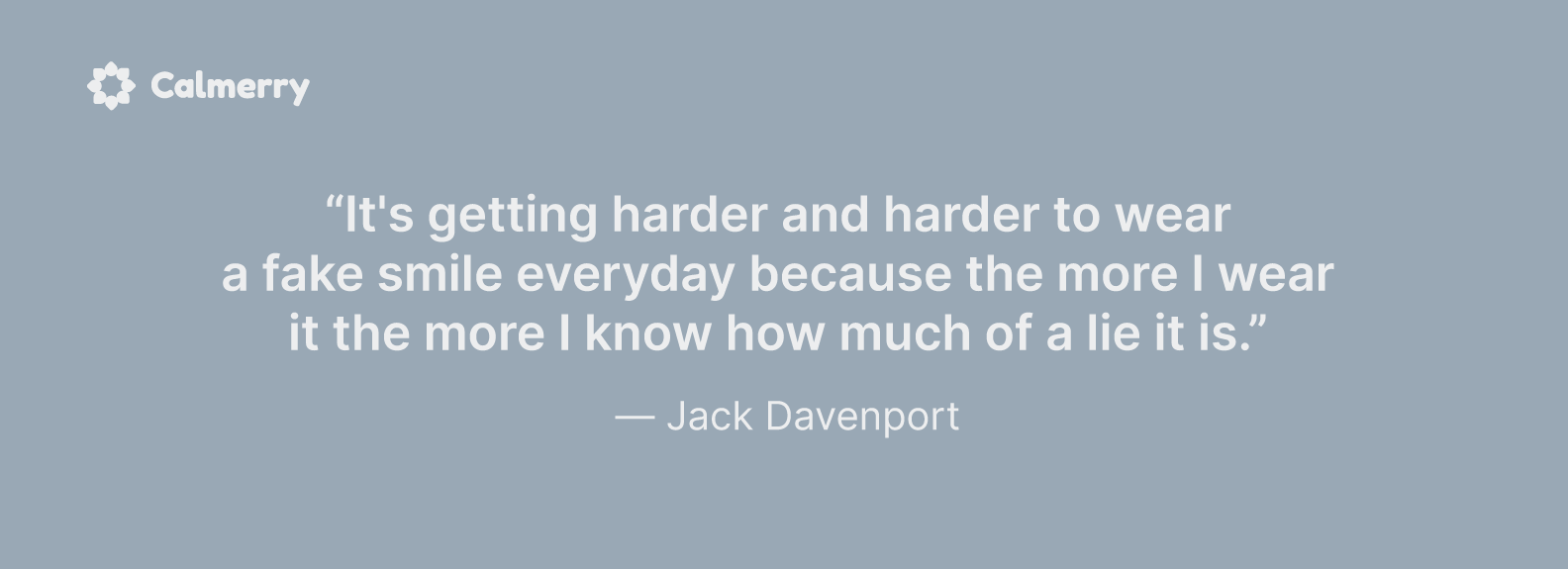Smiling Depression: Symptoms, Causes, How It Looks Like

In this article
Not everyone living with depression looks sad or “depressed.” Some can hide their feelings well, making them appear perfectly fine and happy to others. Yet, despite their positive outward appearance, they are suffering on the inside.
This condition is known as smiling depression, and it’s just as dangerous as other forms of depression. Because it is hard to recognize, it’s often left untreated, which can increase the risk of suicide.
In this article, we’ll look at what smiling depression is, why it occurs, its symptoms, effective treatments, and how to get help. If you think you might have smiling depression or know someone who has, keep reading to learn the best steps to take.
What is smiling depression?
Smiling depression is a widely used term, but it isn’t formally recognized as a condition in the Diagnostic and Statistical Manual of Mental Disorders (DSM-5). Instead, it would more likely be diagnosed as a major depressive disorder with atypical features.
Smiling depression is also known as high-functioning depression.
Smiling depression is a term used to describe someone who appears to be happy, motivated, energetic, and doing well but is experiencing painful symptoms of depression, which they mask or keep secret.

What does smiling depression look like?
Smiling depression is when someone appears happy and cheerful on the outside but feels deep sadness and despair on the inside.
Here are some key points to understand it:
- They smile, laugh, and seem like they are doing fine.
- They maintain their daily responsibilities like work, social activities, and family life.
- Despite their outward appearance, they feel very sad, hopeless, or empty.
- They may feel worthless or think that life isn’t worth living.
- They hide their true feelings from others, often because they don’t want to worry or burden anyone.
- They might think they have to appear strong and put together.
- Because they look happy and are functioning well, friends and family may not realize something is wrong.
If you suspect some symptoms in yourself, this smiling depression quiz can help.
Why it occurs
To understand smiling depression, you need to know what causes some people to mask their symptoms. Here are some common reasons why people choose to put on a smile while facing depression:
Stigma
People with smiling depression may fear being labeled as “weak” or “mad” and rejected by others due to the stigma and prejudice surrounding mental health disorders, so they hide symptoms and put on a positive front instead.
Limited mental health literacy
People who lack understanding about depression are less likely to recognize the signs and seek help. They might assume they don’t have depression and instead believe they just need to be “stronger” or more “successful.”
Fear of consequences
Some individuals with smiling depression may worry that if they tell others about their depression, it could affect their work-life, they might lose respect from friends, or their partner will break up with them, so they hide it instead.
Expectations
Society can sometimes pressure people to act a certain way. For example, men with depression might suppress their feelings because others expect them to be “tough.” People can also have unrealistic expectations of themselves; perfectionism causes them to disguise their symptoms because they want to appear perfect.
Guilt
Someone with smiling depression might have a great job, family, and friends, so they believe they have no reason to be depressed. This makes them feel guilty and ashamed of being depressed when they have a “good life,” so they keep it a secret instead.
People don’t want to burden or disappoint others
People with many responsibilities or who are used to caring for others may find it hard to ask for help themselves. They keep their depression a secret because they don’t want to let others down or trouble them.

Symptoms of smiling depression
Many of the classic symptoms of depression can also affect those with smiling depression. It’s just that they are experienced internally and not expressed in any visible way.
These symptoms can include:
- Feeling down: sadness, guilt, hopelessness, worthlessness, or low self-esteem.
- Appetite changes: weight gain or loss due to overeating or a loss of appetite.
- Anhedonia: loss of interest in activities they previously enjoyed.
- Sleep changes: struggling to get out of bed and oversleeping or trouble getting to sleep and insomnia.
- Suicidal or dark thoughts: ruminating about death or thinking about self-harm and committing suicide.
However, some of the other classic symptoms of depression may present differently, or not at all in those with smiling depression, such as:
- Fatigue: people with depression often experience tiredness, lethargy, and low energy, but those with smiling depression may have high energy levels or only experience these symptoms when they are alone.
- Social issues: people with depression often struggle socially. They might avoid others and isolate themselves. But those with smiling depression can have an active social life, including close family, friends, and a career.
While those with smiling depression can experience any of the symptoms above, it’s important also to remember they often appear to be:
- High-functioning, working, successful, or generally doing well
- Happy, joyful, cheerful, content, or optimistic
- Sociable, funny, likable, popular
Is smiling depression dangerous?
Suicidal thoughts are a common symptom of depression, but it’s believed that individuals with smiling depression can be at a greater risk of death by suicide.
That’s because those living with smiling depression are high-functioning. They have the energy needed to create a suicide plan and follow it through.
Also, because smiling depression is hard to recognize and often goes untreated, it can worsen over time, increasing the risk of suicide.
Important: If you are considering suicide or know someone who is, please seek emergency help right away.
Smiling depression treatment
Once you’ve sought professional help, smiling depression is usually treated similarly to other types of depression. The exact treatment you receive will depend on how severe your symptoms are, but the main options typically include:
Psychotherapy
A therapist helps you understand your depression, as well as your thoughts, behaviors, and feelings. They also help you develop effective coping skills to manage your symptoms.

Medication
Several types of medication are available to treat smiling depression. A doctor will prescribe what is most suitable for the person with depression.
Medication can help ease symptoms, allowing people with depression to get on with their lives better.
Lifestyle сhanges
Exercise, diet, meditation, mindfulness, stress management techniques, light therapy, and other lifestyle interventions may help with smiling depression. Your therapist or doctor will offer recommendations.
How to get help
The first step in tackling smiling depression is to talk to someone about it, such as a trusted friend, family member, or health professional.
Discussing your experiences with a mental health professional, such as a psychologist or trained therapist, can be very helpful, as they can recommend coping strategies and help you treat the condition. Therapists can be seen either in person or online, which makes scheduling time for therapy sessions much more convenient.
Smiling depression (and other forms of depression) is not usually something you can overcome on your own, especially if you have already been experiencing it for a prolonged period, such as multiple weeks, months, or years.
The good news is that once you seek professional help, smiling depression is usually treatable.
Online therapy on Calmerry is a convenient option for those who may have difficulty accessing in-person mental health services, as it allows individuals to receive effective treatment from the comfort of their own homes.
Summing up
Smiling depression could be more prevalent than we all think. But as it’s usually well-hidden, it often goes undiagnosed and untreated. Due to its atypical symptoms, many don’t know they’re depressed or don’t seek help.
Sadly, this only prolongs the suffering and increases the risk of suicide and self-harm.
Attempting to overcome smiling depression alone is never the best option. If you suspect you may have smiling depression, please talk to someone you trust about it and see a mental health professional, as the condition is highly treatable.
Our experienced online depression therapists here at Calmerry are always ready to provide you with the help you need to address depression symptoms and feel better.
online therapy
live video session





